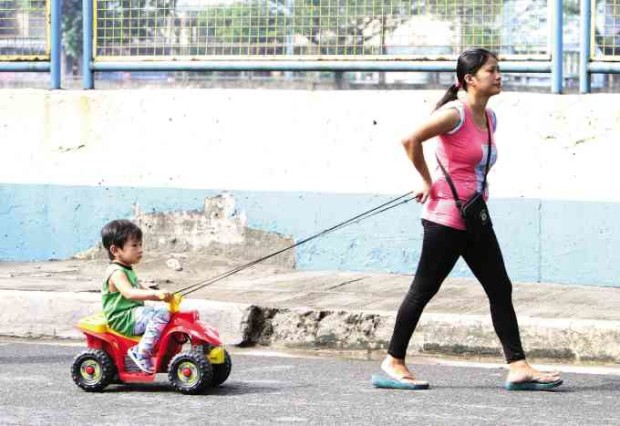Never on Sunday: 5 cities allot carless ‘family zones’

Proponents of the “family zones” project hope to see more residents having entire streets to themselves for rest and recreation, like this mother and her child in Pasig City.—LYN RILLON
Five cities in Metro Manila hope to set a trend by designating car-less, weekend “family zones” or large areas where residents and visitors can once again enjoy being outdoors as a community, free from the noise and pollution of vehicular traffic.
In partnership with the Metropolitan Manila Development Authority (MMDA), the local governments of Caloocan, Taguig, Navotas, Muntinlupa and Pasig are launching the project today.
The idea actually takes a leaf from an earlier Pasig initiative to bar cars from certain areas of the Ortigas business center during weekends. It is now being pushed by the MMDA for replication in other cities.
MMDA assistant general manager for operations Julia Nebrija said that like the designation of carless streets, putting up family zones would provide families and friends with “a safe place to exercise, play and socialize.”
Each zone may not be limited to streets but can extend to other open spaces in the city, like parking lots and waterfront esplanades, said Nebrija, a former World Bank urban specialist-consultant.
Jogging, biking, Zumba
In Caloocan, the designated family zone is the newly opened Saranay-Congressional Road, which will be closed off to vehicles on Sundays and opened for joggers, bikers, Zumba dancers, etc.
In Taguig, the family zone will be in the Taguig Lakefront Community along Circumferential Road 6 (C-6), the city’s first public park which also features a kiddie train.
For Navotas residents who love to do aerobics and taebo, the Centennial Park along C-4 Road in Bagumbayan North would be the place to sweat it out.
Meanwhile, Muntinlupa residents can pass the time in the Bayanan Bay Area along San Guillermo Street.
In Pasig, Emerald Avenue, which was already designated as a carless Sunday street, and the Rainforest Park are the recommended areas where families can enjoy outdoor activities.
The MMDA will put up booths in these areas to promote its antismoking and antilittering campaigns.
Examples overseas
Nebrija said similar projects had been successfully implemented in major cities abroad like Mexico City, Los Angeles and the Colombian capital, Bogota.
In Bogota, for example, the government closes for seven hours more than 100 kilometers of roads to allow the public to enjoy leisure walking and biking, she said.
Apart from encouraging people, especially the youth, to go out in the streets for outdoor activities, such initiatives also help reduce air pollution in these areas.
According to Dr. Paul Evangelista of the Lung Center of the Philippines, vehicle emissions account for 70 percent of the air pollutants in Metro Manila.
Jogging or exercising along busy roads may therefore do more harm than good to one’s health, he said.
Nebrija said more local governments would be following the first five cities in allotting Sunday family zones, as stipulated in Resolution No. 16-13 of the Metro Manila Council, the policymaking body of the MMDA.